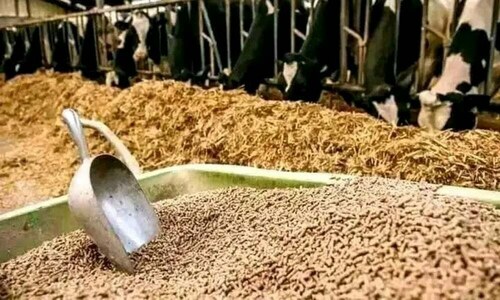Seminar on Enhancing Pakistan’s Fodder Export Held in Bahawalpur
The Trade Development Authority of Pakistan (TDAP), in partnership with the Bahawalpur Chamber of Commerce and Industry, successfully organized a seminar in Bahawalpur centered on “Enhancing Pakistan’s Fodder Export through Best Practices and Market Opportunities.”
This event, the third of its kind following previous successful sessions in Multan and Rahim Yar Khan in December 2024, was designed to strengthen Pakistan’s fodder export capabilities. The focus was on promoting efficient farming methods, adherence to global standards, and strategies for accessing promising markets such as China, Korea, and Qatar.
The seminar was moderated by Ms. Hina Tahir, Deputy Director (Agro & Food Division) at TDAP, and brought together significant stakeholders, including exporters, representatives from the Department of Plant Protection, the Ayub Agriculture Research Institute, and trade representatives from Korea and China. Exporters also participated virtually, highlighting the increasing interest in Pakistan’s fodder export sector.
TDAP’s Commitment to Fodder Export
Athar Hussain Khokhar, Director General (Agro & Food Division) at TDAP, affirmed TDAP’s dedication to opening up international fodder markets through innovation, regulatory compliance, and collaborative efforts. He noted recent trade activities, such as the Pakistan Animal Fodder Delegation to Qatar, which facilitated productive B2B meetings between six Pakistani companies and Qatari firms like Hassad Food, Widam Food, and Baladna, thus creating opportunities for exports of Rhodes grass, alfalfa, and other fodder varieties.
Dr. Qamar Shakil, Chief Scientist at the Agriculture Biotechnology Research Institute, Faisalabad, presented cutting-edge techniques to improve the production of Rhodes grass and other fodder crops, emphasizing quality improvements and sustainable practices to satisfy export market demands.
Market Opportunities in China and Korea
Ghulam Qadir, Trade & Investment Counsellor (Beijing), pointed out China’s leading position as a global feed producer and consumer, with feed imports valued at $13.74 billion in 2024. Although Pakistan’s current share is a modest 1.84% ($253 million), mainly in oil seeds and fish meals, Rhodes grass presents a substantial opportunity due to an already approved import protocol. He encouraged exporters to register with China’s General Administration of Customs (GACC) to activate this protocol and explore negotiations for sorghum and alfalfa, which currently face certain restrictions. Potential Chinese partners identified included key importers such as New Hope Liuhe Co, Ltd and Tongwei Co, Ltd.
Muhammad Hassan Farid, Trade & Investment Counsellor (Seoul), mentioned that Korea imports over 70% of its animal feed, with Pakistan’s exports to Korea reaching $2 million in 2024. He highlighted the untapped potential for cereal straw and bovine feed, dependent on establishing APQA-approved quarantine facilities within Pakistan to meet Korean regulatory requirements.
Dr. Khalid Zafar, Entomologist from the Department of Plant Protection, offered technical advice on the GACC and APQA registration processes, detailing the necessary phytosanitary requirements, including pest control, certification, and pre-shipment inspections to ensure adherence to standards.
Pakistan’s Fodder Industry Potential
Pakistan’s fodder industry, which produces 55 million tonnes annually, including 5 million tonnes of alfalfa, is well-positioned to capitalize on emerging markets. With 470,000 hectares of suitable land in Punjab and competitive production costs, Pakistan has both a cost and logistical advantage, especially for Gulf markets like Qatar, located only 1,100 km away. The recent delegation to Qatar generated significant interest from major buyers, with Hassad Food requesting Rhodes grass product samples and Widam Food beginning vendor registration for Pakistani suppliers. Baladna, a major dairy producer in Qatar, showed strong interest in alfalfa, which corresponds well with Pakistan’s high-quality offerings.
The seminar highlighted the importance of policy measures to improve export competitiveness, such as increasing the number of GACC-registered exporters, accelerating sorghum protocol negotiations with China, and establishing APQA-approved facilities for trade with Korea. Enhanced technical cooperation with Chinese firms for feed processing technology and quality control was also recommended.



Comments (0)
No comments yet. Be the first to comment!
Leave a Comment